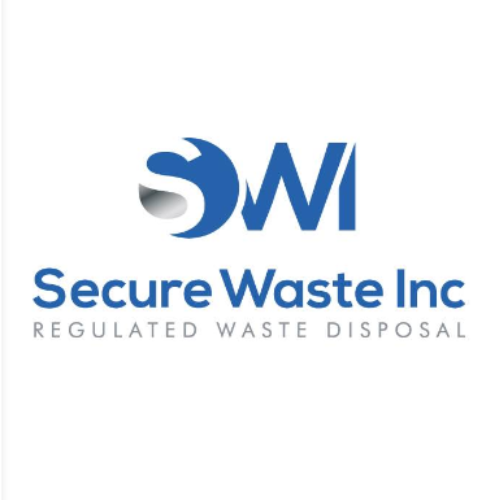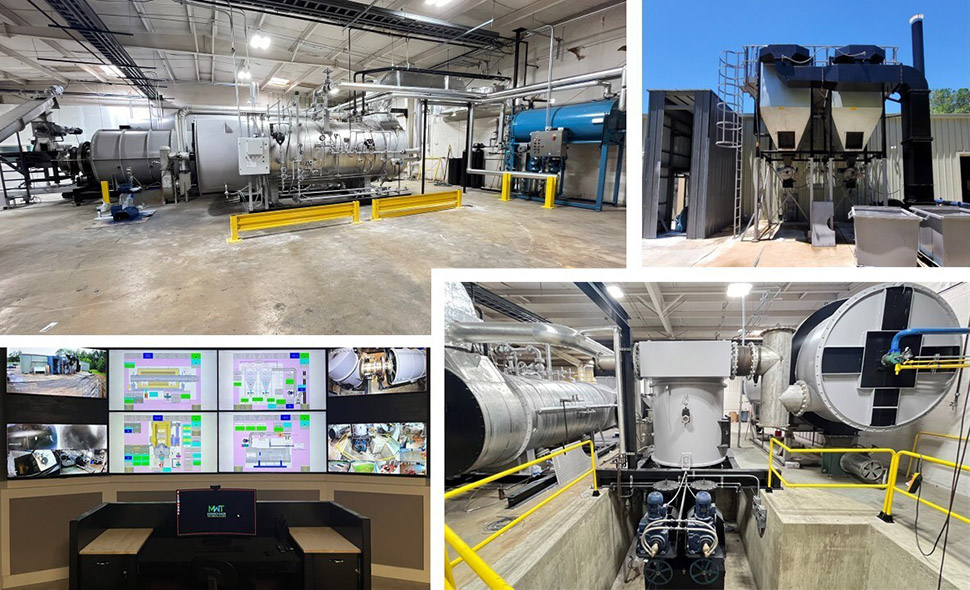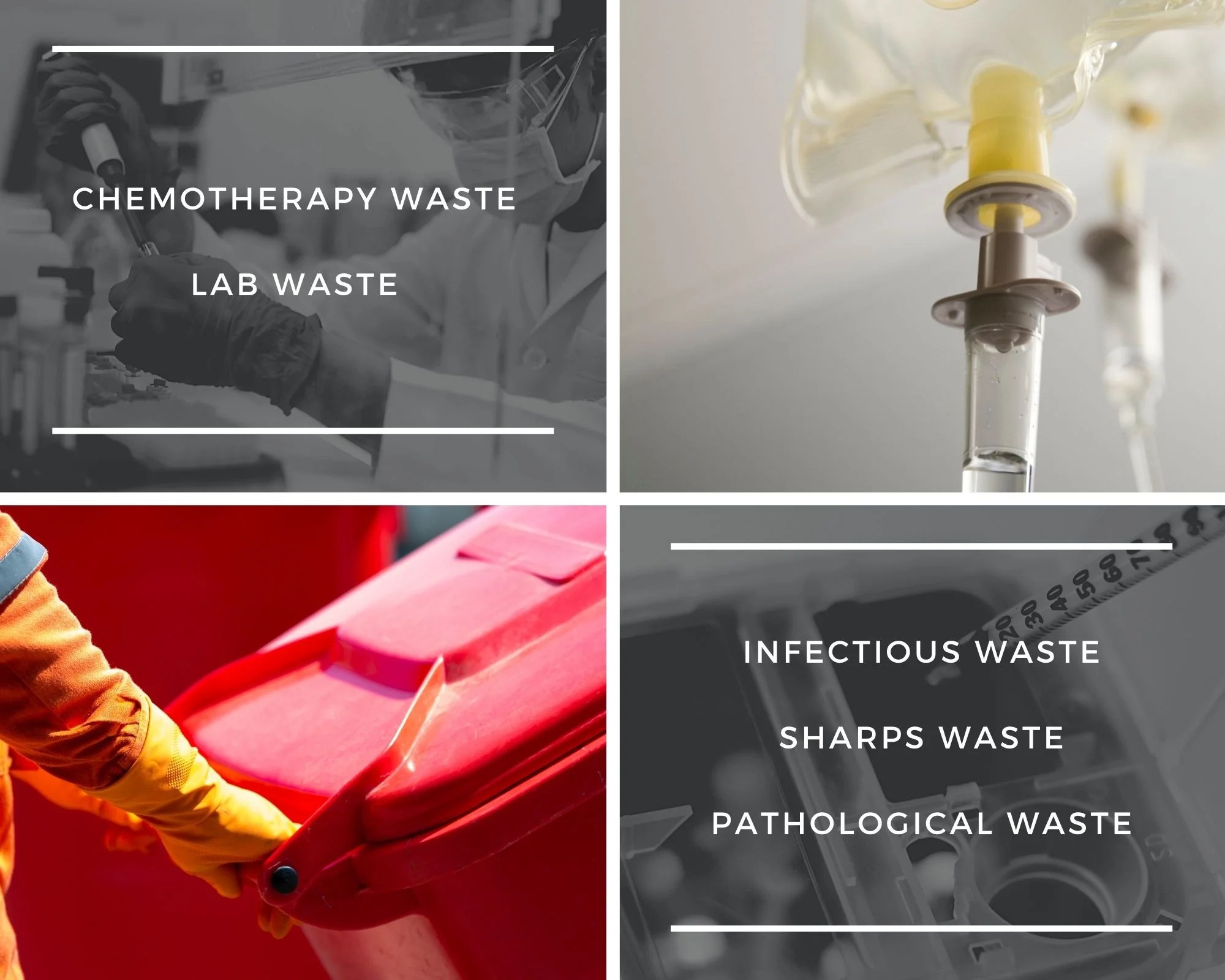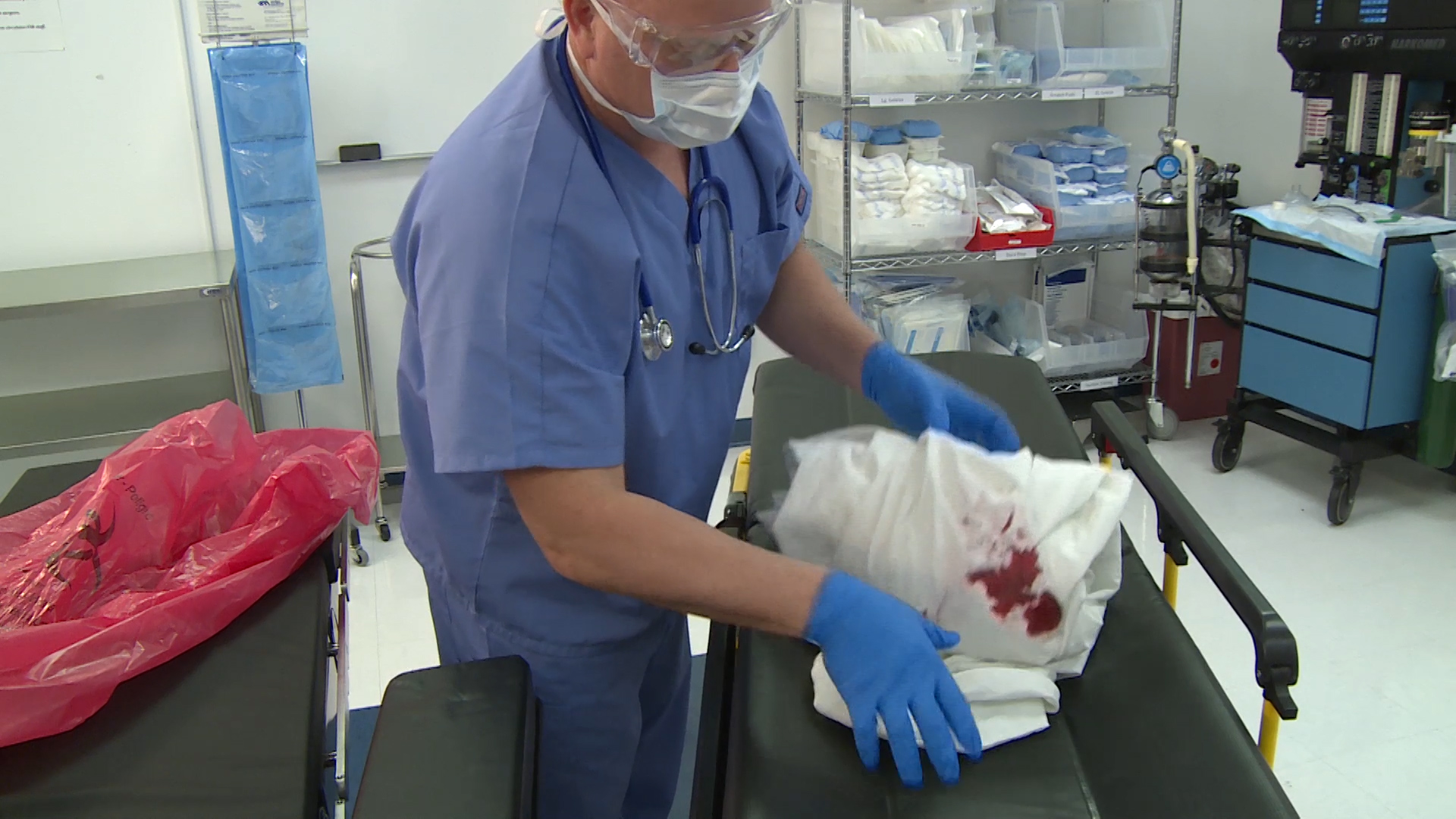The Role of Technology in Modern Medical Waste Management
Healthcare facilities generate massive amounts of waste each year – U.S. hospitals alone produce over 5 million tons of waste annually. Most of this (about 85%) is ordinary trash, but roughly 15% is hazardous medical waste that must be handled safely. Managing this waste is costly, complex and tightly regulated. Fortunately, advances in medical waste technology and healthcare waste solutions are transforming disposal practices. Automated systems and digital tracking greatly improve segregation of sharps and biohazards, while AI-driven analytics and innovative waste-to-energy processes cut waste volumes and emissions. Secure Waste – a regional leader in Maryland, Virginia and Washington, D.C. – integrates these technologies to provide safe, compliant and eco-friendly disposal services. In this blog we explore how smart waste disposal tools (RFID, barcoding, IoT) and hospital waste innovations (AI sorting, data analytics, waste-to-energy) are reshaping medical waste management.
Automation in Waste Segregation and Tracking
Modern hospitals and laboratories are moving toward automated waste segregation and tracking to ensure every container is handled correctly. Simple measures like color-coded bins and labels can be augmented with technology. For example, barcoding on waste bags or containers is a low-cost solution that links each item to its point of generation. Staff scan a barcode before disposal, logging time, location and waste type into a central database. This creates a permanent chain-of-custody record, simplifying audits and regulatory compliance. However, barcoding requires manual line-of-sight scanning and can be labor-intensive for large volumes.
By contrast, RFID tags offer a hands-free, real-time tracking system. Tiny RFID chips ($0.30–$1 each) can be attached to sharps containers, bin liners or carts. When tagged waste passes RFID readers at key points (e.g. an autoclave entry or disposal loading dock), its status is automatically logged. Multiple containers can be read at once without manual scanning. In practice, RFID sensors in “smart bins” continuously report fullness, location and environmental data (temperature, humidity). The result is a highly accurate digital manifest: one case study showed RFID tracking achieved over 98% read accuracy even in humid conditions. Automated logging eliminates paperwork and human error, making audits far simpler (critical for meeting OSHA, DOT and EPA rules). As one industry summary notes, RFID and barcode systems together provide “accurate, tamper-proof records and real-time monitoring” – a boon for regulatory compliance and staff safety.
- Real-Time Location: RFID tags in waste containers allow facilities to monitor bin fill-levels and locations in real time. This enables faster pickups and dynamic route planning for waste haulers, reducing the risk of overflows or unsightly storage.
- Chain-of-Custody Documentation: Automated tracking logs every handoff and process step, from point of use to final treatment. The data are instantly accessible for inspections, minimizing violation risk. Secure Waste’s Maryland medical waste services, for example, emphasize end-to-end digital tracking to ensure compliance with MDE and EPA standards.
- Efficiency & Safety: In a recent pilot study, “smart” waste bins with RFID and AI yielded significant efficiency gains. The system cut collection times by about 30%, reduced hazardous mixing incidents by 81%, and even lowered sharps injuries by 40% through better monitoring. These automated checks help ensure the right waste goes into the right process every time, improving both safety and efficiency.
- Integration with Inventory: Linking RFID tracking to hospital inventory systems can further reduce waste at the source. Experts note that combining RFID and AI “improves hospital resource use by lowering lab waste” and ensuring supplies are optimized. For instance, connected tracking can flag almost-expired items before they become waste.
By leveraging smart bin technology and automated scanning, healthcare facilities can dramatically tighten control over medical waste. Secure Waste implements these healthcare waste solutions in its disposal operations (see our Maryland medical waste disposal page for an example). With RFID and barcode systems, no disposal event goes undocumented – boosting compliance and operational transparency.
AI and Data Analytics in Waste Reduction
Beyond hardware, data analytics and AI are revolutionizing how hospitals minimize waste generation in the first place. Modern hospitals generate vast data on supplies, patient care and waste streams. By analyzing these data, managers can pinpoint waste “hot spots” and forecast demand more accurately. For example, analytics software can flag departments routinely throwing out large volumes of unused kits or expired drugs. Staff can then adjust ordering or storage practices to cut down that waste.
Several case studies demonstrate the power of analytics in healthcare settings:
- Inventory Optimization: At University of California San Francisco Medical Center, an AI-driven inventory system slashed back-ordered supplies by 70% and saved over $300,000 in one year. By forecasting use more precisely, the hospital avoided excess stock that would later expire. Similarly, Mercy Hospital (Springfield) cut pharmacy inventory costs by 20% and reduced stockouts by 30%.
- Pharmaceutical Waste Control: Another healthcare network integrated analytics into its electronic health records to track prescribed vs. returned medications. This allowed quick removal of expired drugs, reducing the risk of diversion and environmental contamination. In fact, one New York hospital used such data tools to classify its waste streams and cut pharmaceutical waste disposal costs by 20%.
- Big Data Insights: Overall, simply quantifying waste generation helps identify improvement areas. “Data shows you how much waste you create, where it comes from, and how to reduce it,” notes one expert review. Trending waste volumes over time reveals process drifts (e.g. rising sharps waste might mean more IVs than needed).
AI also enhances waste sorting itself. Computer vision models can now identify and separate infectious items from general trash. In one experimental system, a fine-tuned AI model (ResNet-50) achieved 93.1% accuracy in classifying medical waste into categories like masks, gloves and syringes. Another pilot used a YOLO (You Only Look Once) model and IoT sensors to automatically detect and sort hundreds of waste samples, achieving over 98% mean average precision in object detection. Such systems drastically reduce manual sorting time, enable safer automated sterilization, and channel more material into recycling streams.
In sum, smart data analytics allows healthcare facilities to track performance, cut unnecessary purchases, and ensure compliance. As a result, many hospitals report sizable waste reductions (10–30%) and cost savings once advanced analytics are in place. Secure Waste complements these efforts by offering consultation on waste audits and reporting as part of its services.
Innovations in Waste-to-Energy
Embedded in the waste management chain is the opportunity to capture energy from medical waste. Waste-to-energy (WTE) systems turn infectious waste into heat, steam or fuel, closing the loop between disposal and power generation. The core idea is simple: burn or convert medical waste at high temperatures and use the heat to make steam for electricity or hot water.
Modern waste-to-energy systems harness the heat from medical waste incineration to produce steam and generate electricity. Such systems typically reduce waste volume by roughly 90% while destroying pathogens.
Traditional incinerators in hospitals were once common, but older designs emitted hazardous byproducts (dioxins, furans) and were phased out. Today’s WTE incinerators are far cleaner. They burn waste at 850–1200°C with advanced scrubbers and filters, destroying 99.99% of pathogens. Importantly, the heat is recovered: steam turbines produce electricity or hot water for the hospital or grid. This dual-purpose approach both disposes of waste safely and offsets fossil fuel use. In fact, modern WTE can slash waste mass by ~90%. The small residual ash (now inert) often ends up in special landfills or is reused in construction.
Emerging conversion technologies take it further. New on-site systems use pyrolysis or gasification instead of simple combustion. These processes thermally decompose waste into syngas (a mix of CO and H₂) and biochar, without fully combusting it. The syngas can be burned cleanly or even used to generate further electricity and heat. Decarbonization experts note that these conversion WTE systems run mostly on the energy from the waste itself (with a small natural gas startup). Because they don’t burn oxygen-rich, these systems produce virtually no dioxin or furan emissions – a huge environmental benefit over legacy incinerators. Hospitals can then use the excess heat for sterilization, domestic hot water or HVAC, dramatically cutting their carbon footprint by reducing transportation and fossil fuel use.
In practice, the advantages of WTE are clear:
- Volume Reduction: Converting waste to energy shrinks volumes by up to 90%, easing pressure on landfills.
- Pathogen Destruction: The high temperatures sterilize even high-risk biohazards, making the remaining material safe.
- Energy Recovery: Facilities recoup energy value (electricity/heat) from waste that would otherwise require costly disposal.
- Lower Transport Emissions: On-site WTE avoids long-haul trucking of waste and its GHG emissions. One guidebook notes that eliminating transport alone yields significant carbon savings.
- Circular Economy: By viewing waste as a resource, hospitals move toward sustainable practices – exemplifying the circular economy in healthcare.
For example, some large medical centers in Europe already co-fire treated medical waste in municipal incinerators to generate district heat, while pilot projects in the U.S. use plasma gasification on-site. Secure Waste’s treatment options include energy-efficient incineration and emerging technologies like microwave sterilization (which generates steam). The Secure Waste Maryland disposal page notes that we “eliminate pathogens and reduce environmental impact by using advanced disinfection and incineration technologies”. In short, modern WTE ties disposal to renewable energy production – a key innovation in hospital waste management.
Benefits of Technology in Waste Management
Implementing these technologies yields multiple benefits:
- Regulatory Compliance: Automated tracking and detailed data logs make it easier to meet strict rules. Auditors can instantly retrieve records showing exactly when and how waste was treated. This transparency helps avoid costly violations. As one source notes, digital logging “ensures accurate, tamper-proof documentation available instantly for audits”. Secure Waste’s services emphasize compliance at every step, leveraging technology to keep facilities aligned with OSHA, DOT, EPA and local laws.
- Cost Savings: Cutting waste generation and streamlining processes directly lowers costs. Studies show impressive savings from tech use: AI inventory control saved UCSF $300K/year, and an RFID-AI waste system trial saw a 23.2% drop in operational costs. Even a simple data-driven sorting of drug waste cut disposal costs by ~20%. Bulletproof scheduling (avoiding extra pickups) and efficient routes reduce hauling costs. Overall, facilities that deploy waste analytics or tracking often report double-digit percent savings in waste management spend.
- Environmental Impact: Tech-driven solutions shrink the eco-footprint. Intelligent sorting means more recyclables and less landfill. Waste-to-energy recovers fuel instead of wasting it – reducing net emissions. Secure Waste highlights sustainable practices, noting it “prioritizes eco-friendly disposal methods to minimize environmental impact”. Modern treatment cuts pollutants too: for instance, optimized incinerator scheduling reduced particulate emissions by 15.2% in one pilot study. By diverting waste from landfills and reusing energy, tech-savvy disposal helps hospitals meet sustainability goals.
- Staff and Patient Safety: Automation reduces handling of dangerous waste. Robotics and AI sorting minimize human exposure to infectious materials. Tracking cut sharps injuries by about 40% in smart-bin implementation. Plus, eliminating excess inventory means fewer chemicals and drugs lying around. In short, technology shields people from hazards while keeping operations efficient.
- Security and Accountability: Digitally controlled systems prevent rogue disposal. Secure Waste provides confidential destruction services (for pharma and records) with full tracking. Hospitals and clinics gain peace of mind knowing nothing dangerous escapes the chain-of-custody.
By integrating these benefits, healthcare providers realize better safety, compliance and profitability. Secure Waste packages these advantages into its comprehensive healthcare waste solutions. With 25+ years of experience, we deliver no-contract, transparent services that leverage technology for compliance and cost-effectiveness.
Real-World Adoption
Around the world, hospitals and waste companies are adopting these innovations. For example, a recent pilot in Jordan combined RFID smart bins, AI vision sorting and optimized routing across four hospitals. The result: 30% faster collections, 81% fewer disposal errors, and 23% lower operating costs. Importantly, the system maintained 90.3% compliance with WHO guidelines, demonstrating that even in resource-limited settings, high-tech waste management can meet global standards.
In the U.S., many large health systems report similar wins. University of California San Francisco used AI analytics to slash stockouts and save over $300K. Mercy Springfield Hospital saw a 20% drop in inventory costs. Another network in California embedded waste tracking in its patient software, ensuring expired drugs were promptly disposed of, reducing diversion risk. Meanwhile, Safety and environmental regulators in states like Maryland and Virginia are beginning to encourage on-site treatment technologies. Secure Waste’s regional success reflects these trends: we serve thousands of providers in Maryland, Virginia and Washington, D.C.. Our local pages highlight this expertise – for instance, the Virginia medical waste disposal page advertises “advanced treatment technologies” and “transparent pricing” for safe, sustainable disposal. And in Washington D.C., Secure Waste is touted as a “top-rated service provider” offering “sustainable and innovative solutions” for regulatory compliance. These real-world examples show that whether it’s a big city hospital or a rural clinic, modern waste management tech delivers results.
Secure Waste: Your Trusted Partner
Secure Waste stands at the forefront of this technological wave in healthcare waste management. As a local leader in MD, VA and DC, our mission is to integrate the latest innovations into a turnkey service. We help you select the right mix of technologies (RFID tracking, AI sorting, on-site treatment) and ensure they work seamlessly. Our on-staff experts understand both the regulatory landscape and the tech landscape. For example, our teams in Maryland and Virginia regularly update procedures to incorporate smart waste bins and electronic waste profiles on our customer portal. As noted on our services pages, we provide “fully compliant medical waste disposal” with advanced tech and responsive support.
Local Expertise: Serving Maryland, Virginia and DC means we know local laws like MDE regulations and DC’s requirements. We leverage this know-how to tailor solutions that meet these strict guidelines. All Secure Waste facilities are licensed and equipped with cutting-edge sterilization (autoclaves, microwaves, etc.) and energy recovery systems. Our Maryland biohazard team, for instance, uses on-site incineration when needed but also provides autoclave and microwave alternatives for appropriate waste streams.
Comprehensive Services: From sharps to chemotherapy to confidential documents, we offer end-to-end services. We prioritize smart waste disposal – using data from each pickup to refine future schedules and routes. And our reusable containers and carts reduce plastic waste. As our Virginia page notes, we enforce flexible, no-contract service to help facilities reduce costs while maintaining compliance.
Eco-Friendly Focus: Sustainable disposal is a core value for us. Secure Waste explicitly markets “sustainable practices” and “eco-friendly disposal methods”. We continually invest in cleaner technologies: for example, we recently installed new WTE boilers at one of our plants to harness waste heat. On our Washington D.C. service page, we highlight sustainable innovation as a competitive advantage.
In short, Secure Waste is more than a hauler – we’re a partner in innovation. We guide clients through adoption of hospital waste innovation, from suggesting RFID programs to analyzing waste audit data, to recommending on-site treatment. Clients consistently praise us as “affordable, dependable” with “great customer service”.
Conclusion
The era of paper logs and landfill-bound waste is ending. Technology-driven strategies – RFID tracking, AI analytics, and waste-to-energy – are proving that medical waste disposal can be safer, smarter and greener. Facilities that embrace medical waste technology enjoy higher compliance rates, lower costs and a lighter environmental footprint.
Secure Waste is here to help your organization seize these benefits. Serving Maryland, Virginia and Washington, D.C., we offer a full suite of regulated waste management services backed by the latest innovations. Whether you need RFID-enabled tracking, on-site sterilization, energy recovery systems, or simply expert guidance, our experienced team has you covered.
Ready to transform your waste program? Contact Secure Waste today for a free waste assessment and quote. Call 877-633-7328 or request pricing online. Let us put technology to work so you can focus on patient care, confident that your waste disposal is safe, compliant and eco-friendly.
Take the next step: Secure Waste is your partner in advanced healthcare waste solutions. Visit our Maryland medical waste disposal page and see how we integrate innovation into every step.

Expert Medical Waste Management: With over 25 years of industry experience, Secure Waste is a trusted local leader in hazardous and biohazardous waste disposal across Maryland, Virginia, and Washington, D.C. Specializing in medical waste management, sharps needle disposal, and biohazard waste removal, the company ensures full compliance with federal, state, and local regulations while prioritizing environmental sustainability.
The company also offers additional services, including secure document shredding and sharps container sales, providing comprehensive solutions for healthcare facilities and businesses. Our cost-effective services help clients maintain regulatory compliance without unexpected costs.
With a commitment to customer satisfaction, Secure Waste offers tailored waste management plans that align with industry best practices. Their team of experts provides reliable, timely, and compliant services, making them the preferred choice for medical waste disposal. For a free waste quote or more information, visit www.securewaste.net






